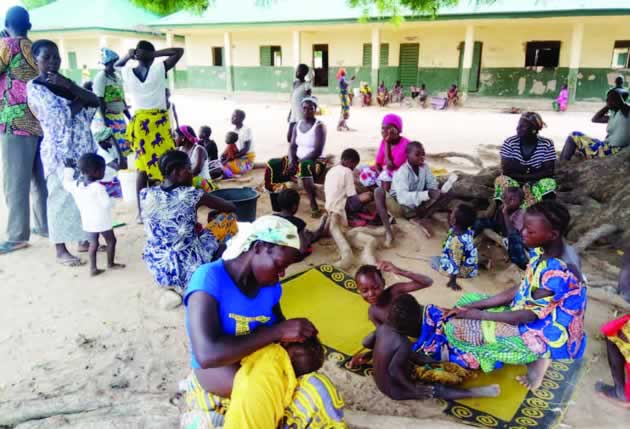
THE virtual abandonment of millions of internally displaced persons despite the billions of naira budgeted for their care is a gross abdication of responsibility by the federal and state governments. Affected by conflicts and natural disasters, over 3.5 million Nigerians have fled their homes and rely on humanitarian assistance to survive. All tiers of government owe IDPs a duty to care for them, and eventually return them to their homes in safety.
Recent reports of their plight depict a treacherous neglect of these compatriots who have fallen into abject misery through the carelessness and ineffectiveness of the Nigerian state.
The North-East accounts for half of the displaced persons, with over 304 camps and over 2,000 locations across the region, say aid agencies.
Nigeria also hosts about 73,000 refugees from 23 countries, while over 500,000 Nigerians are awaiting repatriation from Chad, Niger, Cameroon, Mali, Libya, and other countries, according to the National Commission for Refugees, Migrants and Internally Displaced Persons. Urgent and pragmatic measures should be taken to resettle the displaced persons in their home communities as soon as it is safe to do so.
Meanwhile, thousands of IDPs in Zamfara State have reportedly become beggars and scavengers, years after they were sacked from their villages and towns by bandits, illustrating the neglect and deprivation of victims and the government’s failure to protect them.
Many are currently taking shelter in uncompleted public buildings, motor parks and markets within Gusau, the state capital.
Many communities in Benue State similarly displaced by murderous Fulani herdsmen since 2010 have also not been resettled and endure dehumanising conditions as the authorities have failed to set up a proper camp.
In many IDP camps across the country, basic amenities like schools, clinics, water, food, and sanitation are either lacking altogether or gravely inadequate.
A promise by the NCFRMI to build “resettlement cities” in Borno, Kano, Edo and Katsina has not been fulfilled. NGOs allege that the duplication of the responsibilities by the National Emergency Management Agency, NCFRMI, and the North-East Development Commission engenders corruption and inefficiency.
Providing durable solutions should be a priority of the federal and state governments with the backing of international relief agencies.
Pending their reintegration and resettlement, the government should address their immediate needs and provide psycho-social support to help them rebuild their lives. They should provide emergency shelters, clean water, food, and sanitation facilities and other essentials such as clothing, blankets, and hygiene kits.
They should also provide mobile clinics and vaccinations to prevent epidemics. Special attention should be paid to the health needs and safety of vulnerable groups such as children, women, and the elderly. A standard IDP camp should have a temporary school or learning centre for children.
Effective security measures and legal frameworks must be in place to protect them from violence, abuse, and exploitation. Vocational or skill centres are needed to help the camp inhabitants regain a level of economic independence.
The UN’s action plan to take at least 10 million people out of displacement across the globe, lists Nigeria among the selected pilot 16 countries. Already, the Labondo Local Integration Pilot project in the Girei Local Government Area of Adamawa State is supporting 454 households.
The construction of cluster resettlement homes for the Benue IDPs by the Ministry of Humanitarian Affairs and Poverty Alleviation is also helpful. In October, it handed over 40 completed houses to IDPs in Gusau.
International humanitarian law mandates care for refugees, especially arising from armed conflict; Nigeria’s governments should key strongly into this.





